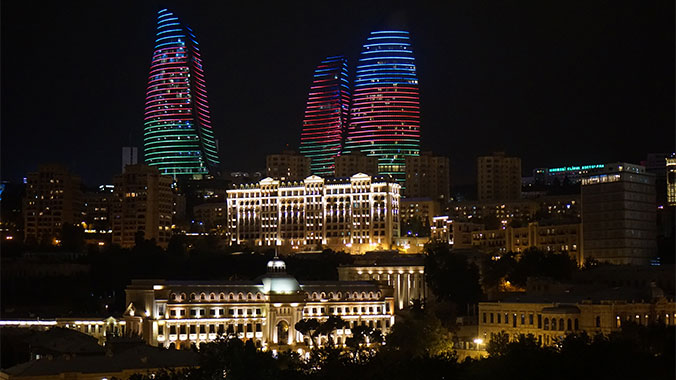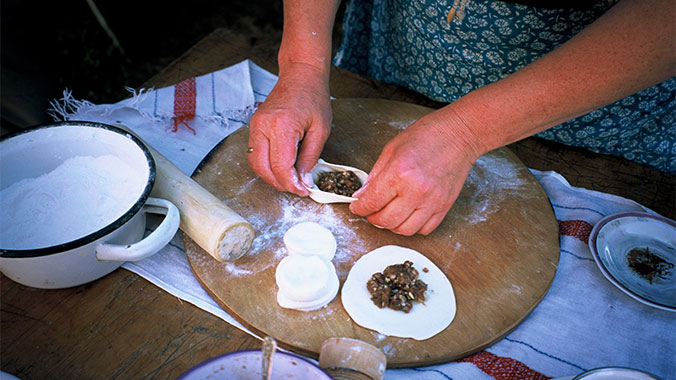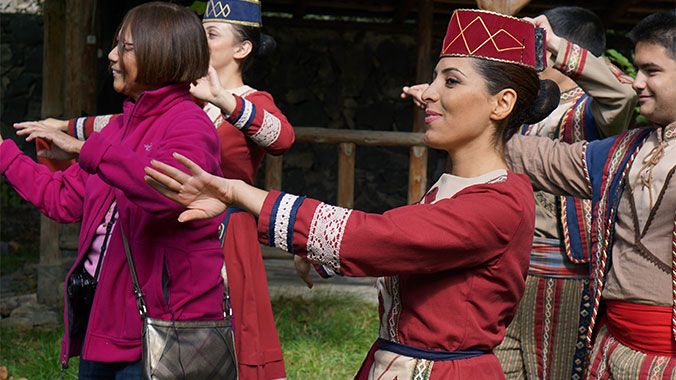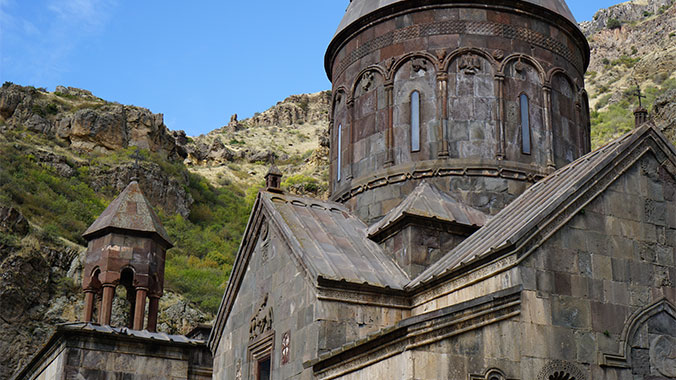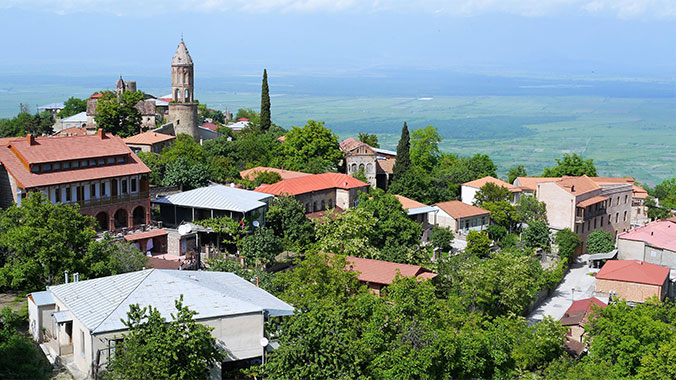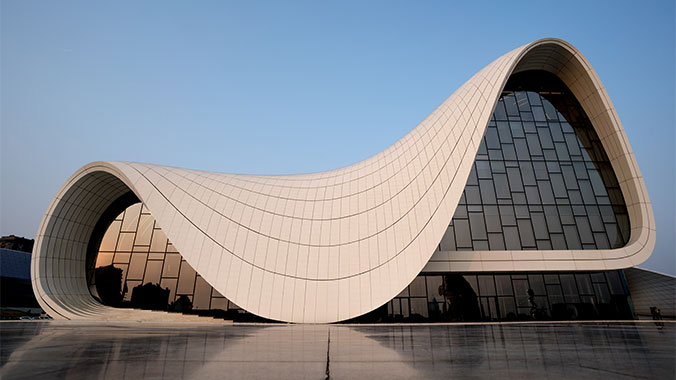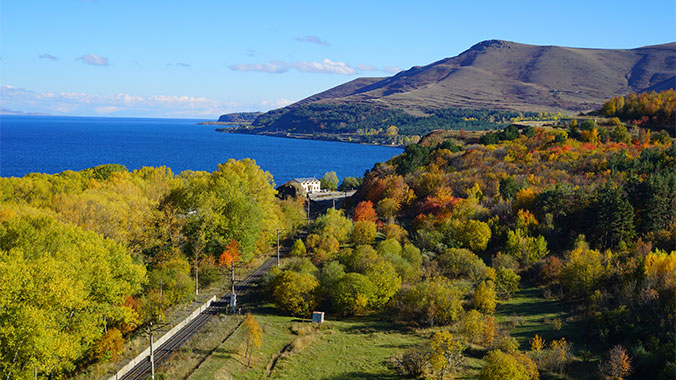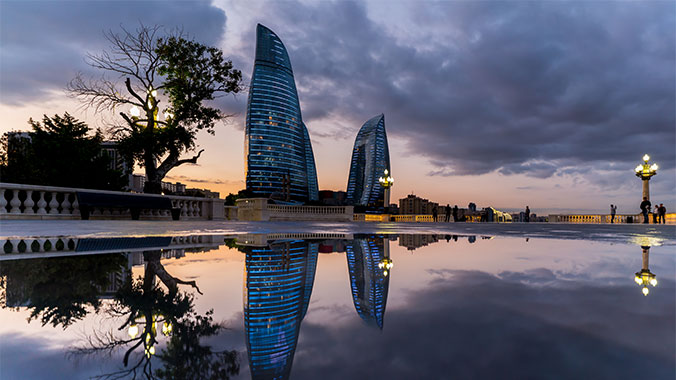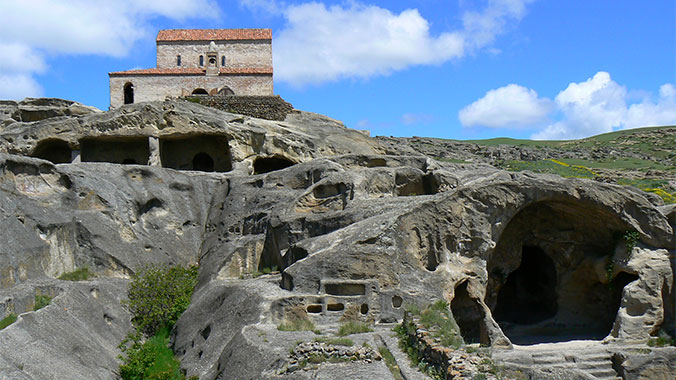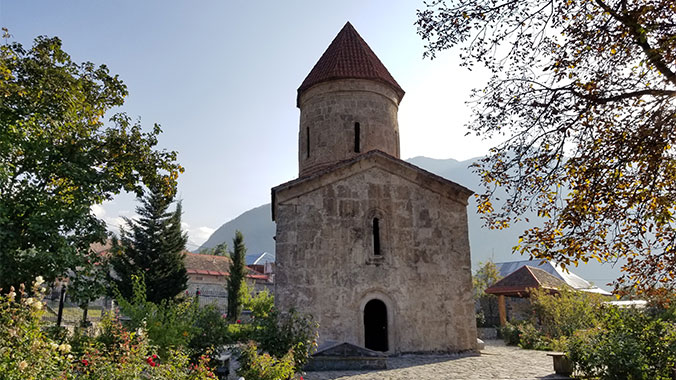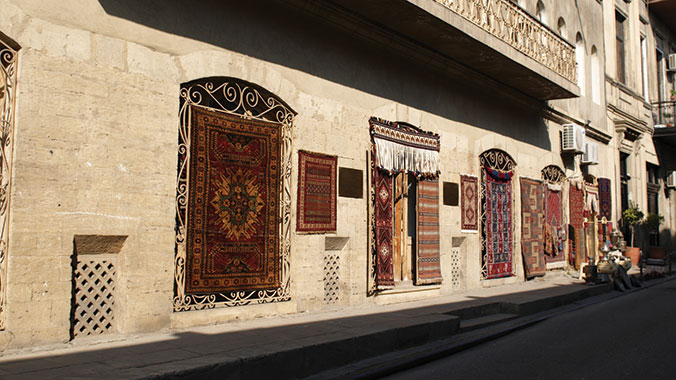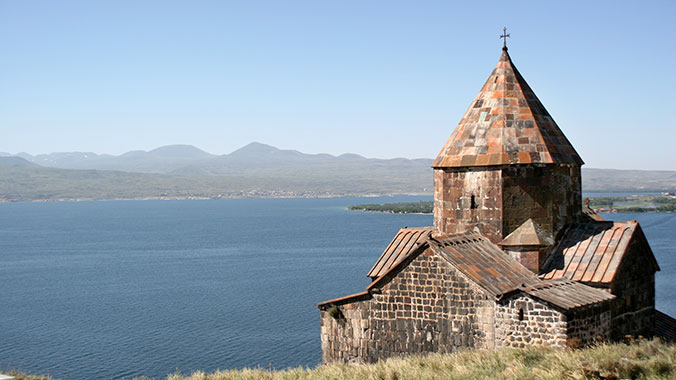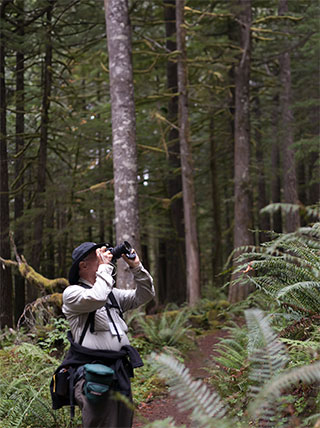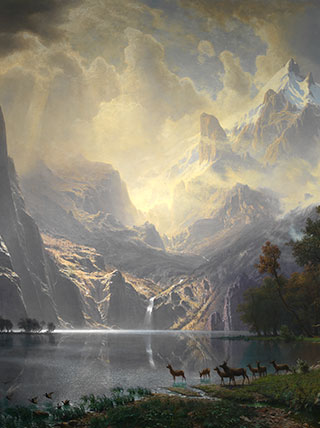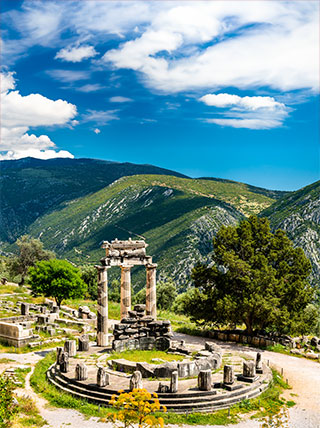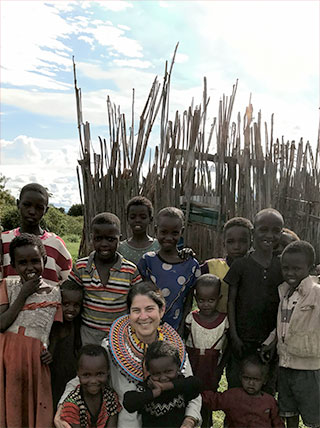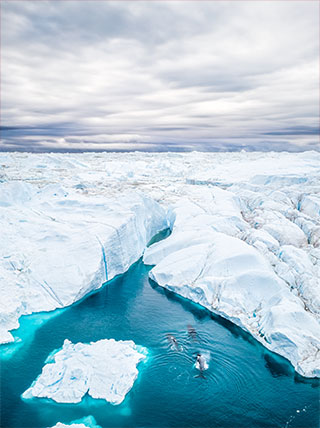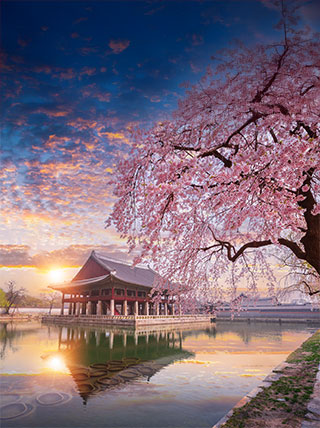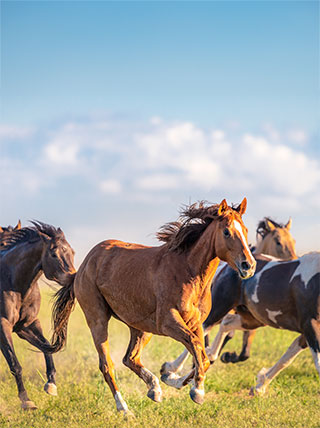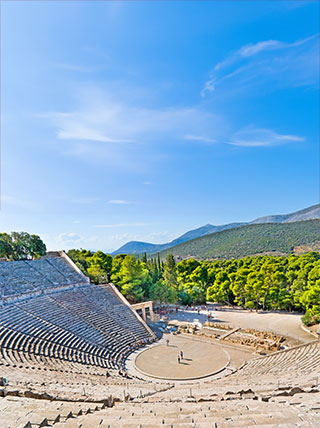Azerbaijan/Georgia/Armenia
South Caucasus Odyssey: Azerbaijan, Georgia and Armenia
Program No. 1690860MEADV-1116-60
Gain a deeper understanding of the South Caucasus as you visit sacred monuments, sample traditional cuisine, attend cultural performances and learn the story of this ancient region.
Enroll with Confidence
We want your Road Scholar learning adventure to be something to look forward to—not worry about. Learn more
Protecting the Environment
We offset a portion of the emissions created by your travel. Learn more
Prefer to enroll or inquire by phone?
800-454-5768
Select your type of room
Price will update based on selection
Prices displayed below are based on per person,doubleoccupancy.
DATES
& starting prices
PRICES
DATES
& starting prices
PRICES
Not seeing the date you're looking for?
To be notified if dates of this program become available, click the button below.
This date is available to book as a private experience for your group!
15 days
14 nights
33 meals
13B 12L 8D
1
In Transit to Program
In Flight
4
Baku / drive to Sheki
Sheki
5
Sheki / Khan's Palace
Sheki
11
Drive to Yerevan / Lake Sevan
Yerevan
15
Program Concludes
In Flight
At a Glance
Delve into the wildly diverse cultures and landscapes of the South Caucasus — a mountainous strip of land between the Caspian and the Black Seas and home to the countries of Azerbaijan, Georgia and Armenia. Discover the heritage behind the bold designs of Azerbaijan’s carpets, savor deep red wines, and visit bakeries, artists’ studios and craft centers in Georgia, and admire the sculpted stone khachkar crosses that dot the green hillsides of Armenia, the world’s first Christian country.
Activity Level
Let's Go!
Walking 1-2 miles on varied terrain; some steep stairs and some stairs without railings. Standing in museums. Elevations up to 6,200 feet.

Small Group
Love to learn and explore in a small-group setting? These adventures offer small, personal experiences with groups of 13 to 24 participants.
Best of all, you’ll…
- Investigate the musical history of Azerbaijan, with its origins stretching back before 3000 B.C.
- In Armenia, visit Echmiadzin Cathedral — a UNESCO World Heritage Site and home to what some say is a piece from Noah’s Ark.
- Witness demonstrations of traditional bread-baking, vodka distilling and the making of churchkela, the wonderful Georgian sweet.
Suggested Reading List
(21 books)
Visit the Road Scholar Bookshop
You can find many of the books we recommend at the Road Scholar store on bookshop.org, a website that supports local bookstores.
South Caucasus Odyssey: Azerbaijan, Georgia and Armenia
Program Number: 16908
A Spy by Nature
Introducing the London School of Economics graduate and reluctant British spy Alec Milius. When he lands a prime job for a British oil company, Alec finds himself trapped in a world of secrets and lies that could cost him his life.
Gentlemen of the Road
This medieval adventure by Pulitzer Prize-winner Chabon is set in the Caucasus Mountains, where two thieves for hire are responsible for the fate of the empire of the Khazars.
Black Dog of Fate, A Memoir
This powerful memoir combines Balakian's coming-of-age as an Armenian-American in New Jersey with his growing realization of the horrors suffered by his family in the Armenian genocide of 1915 in Ottoman Turkey.
Ali and Nino, A Love Story
The deeply sentimental tale, set in Baku in the years before WWI, of an Azerbaijani Muslim boy in love with a Georgian Christian girl, originally published in 1937.
Caucasus, A Journey to the Land between Christianity and Islam
An engaging account of travels in the Caucasus in the footsteps of Imam Shamil, a Muslim who resisted the Russians in the 19th century. The book is a portrait of the people, land and issues in the region.
Russia's Steppe Frontier, The Making of a Colonial Empire, 1500-1800
In this sweeping, scholarly history Khodarkovsky traces Russian imperial adventures in the Caucasus from the decline of the Mongols to the end of the 18th century.
Taste of Persia, A Cook's Travels Through Armenia, Azerbaijan, Georgia, Iran, and Kurdistan
Centering on a culinary tradition that is (alas) poorly understood in the West, this cookbook presents 125 recipes from the Caucasus and Middle East, framed with locals' stories and photographs.
Passage to Ararat
Arlen's National Book Award-winning memoir of his father and the rediscovery of his Armenian heritage. He interweaves stories of travel and family with an account of the troubled history of the country.
The Georgian Feast
Historian and food expert Goldstein explores the food, traditions and geography of Georgia, as beautiful as it is bountiful, in this savory cultural history. With illustrations by delightful 19th-century primitivist Niko Pisosmani.
The Caucasus, An Introduction
A timely, readable portrait of the Caucasus by an experienced journalist working in the region. With historical background, insight into energy production and an analysis of struggles for independence.
Lonely Planet Georgia, Armenia & Azerbaijan
An excellent practical guide featuring a good overview of culture, history and nature, 16 pages of color photos, 40 maps and a language guide.
Caucasus: Georgia, Armenia, Azerbaijan Map
A travel map of the Caucasus at a scale 1:1,000,000.
The Ghost of Freedom, A Modern History of the Caucasus
A professor at Georgetown, King reveals the imperial ambitions, larger-than-life personalities and romance of this strategic region.
Stories I Stole, A Journey to Georgia
Witty, engaging and attuned to the complexities of history and ethnicity, Steavenson, a veteran journalist, spins lyrical tales of the former Soviet Republic of Georgia as it crumbles around her in the late 1990s.
For the Love of Wine
After falling in love with Georgia and its celebrated wine, Alice Feiring travels throughout the country meeting winemakers, farmers, artists and more, collecting both stories and recipes to present a compelling portrait of a stunning country and its remarkable people.
Stalin: New Biography of a Dictator
An authoritative, illuminating biography of Georgian Josef Stalin, who ruled the Soviet Union from 1929 until his death in 1953 and caused the death and imprisonment of more than a million Soviet citizens per year.
A Hero of Our Time
The story of the bored and cynical antihero Pechorin. A subtle, psychological and brooding masterpiece of Russian Romanticism originally published in 1840, it influenced later 19th century greats including Tolstoy, Dostoyevsky and Chekhov.
Samarkand
An excellent introduction to Samarkand (by turns inhabited by Uzbeks, Tajiks, Russians, Turks, Koryo-Sarams, Jews and Afghans), this compendium brings the region to life with essays, photos and plenty of recipes little-known to the West.
Black Sea
In this skillful regional portrait, Ascherson weaves his own travels and impressions with a fascinating account of the Black Sea's history. From ancient mythology to modern politics, he admirably never loses sight of the sea itself.
Highlanders, A Journey to the Caucasus in Quest of Memory
In this astute portrait of a complex region in the wake of the Soviet Union dissolution, an Israeli journalist travels into the Caucasus to uncover what fuels the conflicts that divide the region's many ethnic and religious communities.
An Armenian Sketchbook
Newly translated, Grossman's journal of a stay in Armenia in the early 1960s affectionately depicts the people and traditions of a mountain village.
Program
At a Glance
Duration
15 days
Program Begins
Baku
Program Concludes
Yerevan
Group Type
Small Group
Meals
33
| 13B |
12L |
8D |
Activity Level
Delve into the wildly diverse cultures and landscapes of the South Caucasus — a mountainous strip of land between the Caspian and the Black Seas and home to the countries of Azerbaijan, Georgia and Armenia. Discover the heritage behind the bold designs of Azerbaijan’s carpets, savor deep red wines, and visit bakeries, artists’ studios and craft centers in Georgia, and admire the sculpted stone khachkar crosses that dot the green hillsides of Armenia, the world’s first Christian country.)
Best of all, you'll...
- Investigate the musical history of Azerbaijan, with its origins stretching back before 3000 B.C.
- In Armenia, visit Echmiadzin Cathedral — a UNESCO World Heritage Site and home to what some say is a piece from Noah’s Ark.
- Witness demonstrations of traditional bread-baking, vodka distilling and the making of churchkela, the wonderful Georgian sweet.
Activity Level
Let's Go!
Walking 1-2 miles on varied terrain; some steep stairs and some stairs without railings. Standing in museums. Elevations up to 6,200 feet.
Small Group
(13 to 24)
Love to learn and explore in a small-group setting? These adventures offer small, personal experiences with groups of 13 to 24 participants.
Suggested Reading List
View Full List
(21 Books)
You can also find many of the books we recommend at the Road Scholar store on bookshop.org, a website that supports local bookstores.
HAVE QUESTIONS?
Prefer to enroll or inquire by phone?
We can help. Give us a call, and we can answer all of your questions!
Call
800-454-5768
While we make every effort to ensure the accuracy of our published materials, programs are typically advertised more than a year prior to their start date. As a result, some program activities, schedules, accommodations, personnel, and other logistics occasionally change due to local conditions or circumstances. Should a major change occur, we will make every effort to alert you. For less significant changes, we will update you during orientation. Thank you for your understanding.
Duration
15 days
14 nights
What's Included
33 meals | 13B | 12L | 8D |
5 expert-led lectures
45 expert-led field trips
5 hands-on experiences
4 performances
An experienced Group Leader
13 nights of accommodations
Taxes and customary gratuity
Road Scholar Assurance Plan
Day
1
In Transit to Program
Location:
In Flight
Day
2
Arrive in Baku, transfer to hotel, check in
Location:
Baku
Stay:
Radisson Hotel Baku
Activity Note
Hotel check-in is available from 2:00pm local time. The altitude in central Baku is -91.9'.
Evening:
Arrive in Baku this evening and transfer to your hotel.
Day
3
Old City / Carpet Museum / Heydar Aliev Cultural Center
Location:
Baku
Meals:
B,L,D
Stay:
Radisson Hotel Baku
Activity Note
Getting on/off bus; driving approximately 15 miles over the day mostly in city. The morning walking tour is about 2-2.5 hours with about 2 miles of walking on uneven and hard surfaces. Shirvan Shah Palace has some uneven and rough steps with no handrails.
Breakfast:
Breakfast at the hotel.
Morning:
Begin the day with an orientation meeting outlining the structure of the trip and introducing educational themes. Explore Baku’s Old City, Icheri Sheher. Once the whole city, this is the best place to get a sense of Baku's history. It is completely encircled by the old city walls with their medieval gates. The winding streets and alleyways are home to private residences, mosques and madrassahs, carpet merchants and tiny shops. Pass by the UNESCO listed Maiden’s Tower and Shirvan Shah Palace.
Lunch:
Lunch at a local restaurant.
Afternoon:
The vivid colors and bold designs of Azeri, Caucasian and Iranian carpets are on display at the State Museum of Azerbaijani Carpets and Applied Folk Art. The museum collection was begun in the late 1960s, but the carpets in the museum today date as far back as the 16th century. Regional differences and stylistic details are highlighted, revealing how traditional carpets marry practical value, artistic merit, historical significance and beauty. Tour the interior of the Heydar Aliyev Cultural Center, a landmark of modern Baku. Opened in 2012, the center houses an innovative performing arts auditorium and spaces for major art exhibitions. The 619,000-square-foot building was designed by famed Iraqi-British architect Zaha Hadid, one of the most influential architects of the 20th and 21st century and the award-winning master behind such buildings as the London Aquatics Center, the Rosenthal Center for Contemporary Art in Cincinnati, Ohio, and the Guangzhou Opera House in China. Inside the center you will learn about the history and culture of Azerbaijan and enjoy some free time to independently browse the exhibitions.
Dinner:
Welcome dinner at a local restaurant. Over dinner meet a local expert and enjoy a lecture on current affairs.
Day
4
Baku / drive to Sheki
Location:
Sheki
Meals:
B,L,D
Stay:
Sheki Palace Hotel
Activity Note
Getting on/off bus. Morning transfer of about 25 miles/1.5 hours to Gobustan with a stop at Bibi Heybat Mosque. The Gobustan visit will take about 1 hour, walking tour outdoors with uneven steps and no handrails and a visit to the indoor museum. Surfaces at Gobustan may be slippery on rainy days. The afternoon drive to Sheki will be about 165 miles / 3 to 4 hours. The highest altitude today will be 2625'.
Breakfast:
Breakfast at the hotel.
Morning:
Depart by coach to Sheki making several stops along the way. Stop at Bibi-Heybat Mosque, originally constructed in the 13th century and completely destroyed in 1934 by Stalin’s decree. Local legends say that a white-robed woman was seen disappearing into the sea the day after the mosque’s destruction. Reconstructed from plans and photographs, the new mosque was dedicated in 1998. Today it sits near one of Azerbaijan’s first oil fields, developed during the first oil boom in the late 19th and early 20th centuries. Tour Gobustan, an important site of ancient petroglyphs, added to the UNESCO World Heritage list in 2007. Quarry workers discovered the rock carvings here by accident in the 1930s. Since then, the carvings depicting men, women, animals and artifacts have been the focus of much study and speculation. An excellent modern museum adds to the experience. Continue to Shemakha, former capital of the once-powerful Shirvan Khanate from the 6th to the 15th centuries. Explore the town, passing by the 10th century Djuma Mosque, the oldest mosque in the Caucuses.
Lunch:
Lunch at a local restaurant in Shemakha.
Afternoon:
Continue to Sheki after lunch, arriving in the evening.
Dinner:
Dinner this evening at the hotel restaurant with traditional Azeri musical entertainment. Musical history in Azerbaijan dates from before 3000 BC. Its most well-known form is mugham, a fusion of Persian and Turkic traditions honored as a World Cultural Masterpiece by UNESCO. This mesmerizing music is usually sung, accompanied by traditional instruments. Ancient and modern poems, in the Azeri, Persian and Arabic languages are set to music, using a subtle scale of 84 micro-intervals and no time signature. The resulting unwritten pieces are passed by ear through generations to provide the improvisational bases for the songs.
Day
5
Sheki / Khan's Palace
Location:
Sheki
Meals:
B,L,D
Stay:
Sheki Palace Hotel
Activity Note
Mostly on foot today. The morning walking tour will be 2.5-3 hours and the Old Town of Sheki is mostly cobble stone surfaces. There are several steep stairs in the Khan's Palace with no handrails. Afternoon at leisure around town, visiting the market, shops and craftsmen studios.
Breakfast:
Breakfast at the hotel.
Morning:
Take a morning walking excursion of charming Sheki. Founded some 2,700 years ago, Sheki is among the oldest settlements in Azerbaijan. Exploration of Sheki includes a visit to the mosaic-covered Khan's Palace with its brilliant stained glass work, the fortress that surrounds the palace, the History and Crafts Museums, and a walking tour of local craft shops and bakeries.
Lunch:
Lunch at a local restaurant.
Afternoon:
Free time to explore Sheki on your own.
Dinner:
Dinner this evening is at the hotel.
Day
6
Sheki / drive to Telavi, Georgia
Location:
Telavi
Meals:
B,L,D
Stay:
Holiday Inn Telavi
Activity Note
Getting on/off bus. The driving distance to Telavi is about 145 miles / about 4 hours plus the time required for the Azerbaijan/Georgia border crossing. The bus will park near to all visited sites and there will be minimal walking. There are some stairs without handrails inside the yard of the Bodbe monastery. The town of Signagi and the winery are on hills and participants will walk a short distance on an uneven cobblestone road. The altitude in Telavi is about 2600'.
Breakfast:
Breakfast at the hotel.
Morning:
Today depart by coach for Georgia. After the border crossing formalities, meet your Georgian guide and change to a local coach. Travel through the Kakheti region, the most important wine-grape-growing area of the country. Georgian wine is well regarded throughout the world and some of the country's best comes from Kakheti. Stop for a walking tour of the beautiful hill town of Signagi known for its cobbled old town square, the nearby Bodbe Nunnery, and the remnants of an impressive 18th century defensive wall that still surrounds part of the city. The wall’s towers were named for the nearby villages, and the townspeople were meant to gather at their tower in times of trouble. Wander the narrow streets and admire the richly carved balconies and the green Alazani valley below.
Lunch:
Take a tour of the Pheasant’s Tears Winery, producing organic wines from varietal grapes that grow well in the Kakhetian micro-region. The name of the winery comes from a Georgian legend in which the hero claims that it takes a “wine beyond measure” to make a pheasant cry tears of joy. The owner is an American man. Sample wines from Georgia’s famous wine region at a tasting and perhaps purchase a bottle of a new favorite to share with friends and family back home. Enjoy lunch at the winery.
Afternoon:
Meet with women from the Nukriani Community Organization, who make chewy Georgian sweets called churchkhela, and also sell natural jams, nuts, and handmade local natural products. Nukriani is a small town located near Signagi. Enjoy a class on making felt.
Dinner:
Taste Georgian craft beers and local snacks at Lost Ridge Brewing, where you will have a demonstration in making of Georgian snacks.
Day
7
Tsinandali / Chavchavadze Estate / Alaverdi Cathedral
Location:
Telavi
Meals:
B,L,D
Stay:
Holiday Inn Telavi
Activity Note
Getting on/off bus; the bus will park near to all sites visited today to minimize walking. There will be about 2 hours of driving in total. The drive from Telavi to Tsinandali is about 15 miles / 30 minutes each way. There are some stairs inside the Chavchavadze Estate Museum and at Alaverdi.
Breakfast:
Breakfast at the hotel.
Morning:
Visit Tsinandali village, best known for the family estate of Alexander Chachavadze, located here. A 19th century Georgian aristocrat and poet, Chachavadze managed to serve admirably in the Imperial Russian army during the times he wasn’t fighting Russia for Georgian independence. His estate was a center of the intellectual life of the time. Here he and his father founded the first and foremost winery in the country, which still produces the dry white Tsinindali wine. His mansion has been transformed into a museum in honor of the poet and hero. Continue to Alaverdi Cathedral, one of the tallest churches in Georgia and, in its simplicity, one of the most striking. One of the 13 Syrian Fathers, Joseph of Alaverdi, established the first church here.
Lunch:
Drive to the village of Alvani, gateway to the Tusheti highlands of Georgia, and enjoy a traditional Georgian Table in a private home – an unforgettable opportunity to taste authentic Georgian dishes and local wines while regional performers entertain. Also see a demonstration of traditional bread baking, vodka distilling and Georgian churchkela making, the wonderful Georgian sweet.
Afternoon:
Stop in at the workshop of a ceramicist who makes qvevri, the 200 to 900-gallon earthenware vessels used for fermenting and storing Georgian wines. Because of the increasing interest in natural traditional-made wines, the demand for qvevri has increased greatly in recent years. The ceramicist will demonstrate and explain the qvevri-making process and present the resulting vessels.
Dinner:
Dinner at the hotel.
Day
8
Telavi / Tbilisi / Old Town Walking Tour
Location:
Tbilisi
Meals:
B,L,D
Stay:
Courtyard by Marriott Tbilisi
Activity Note
Getting on/off bus; the bus will park near to all sites visited today and the total driving distance will be about 100 miles / 2 hours. There will be an afternoon walking tour around Old Town Tbilisi, which will include some periods of walking and standing on hard surfaces and some sites involve 10-20 stairs with and without handrails. The walking tour will be punctuated with many stops. The highest altitude today is Tbilisi at 2530'.
Breakfast:
Breakfast at the hotel.
Morning:
Drive by private coach to Tbilisi.
Lunch:
Lunch at a local restaurant upon arrival in Tbilisi.
Afternoon:
Spend the rest of the day getting to know Tbilisi, Georgia’s gorgeous capital city, on a combination walking and driving tour. Georgia’s strip of central lowlands has long been an important link between East and West. Tbilisi is set at the mouth of this passageway, in the Mtkvari River valley, and has changed hands many times. Most notably, the Arabs ruled the city for 400 years before King David the Builder defeated them in 1121 and moved his capital here from Kutaisi. The Georgian king fostered tolerance for Tbilisi’s Arab population, and the city still has a multiethnic atmosphere. The red-roofed old town, its houses sporting carved wooden balconies, sits beneath the Narikala Fortress on the hill above. Tbilisi was last razed in 1795 by Aga Khan, and most of the current buildings date from that time. The domed sulfur baths and the stone Anchiskhati Church where all that survived. View the 13th century Metekhi Church of the Virgin, constructed on an outcropping above the river on the site of David the Builder’s former palace. See Tbilisi’s earliest sulfur baths, probably built during Arab rule in the 7th or 8th centuries, when hot springs were discovered just under the surface of the old part of Tbilisi. In the 13th century there may have been up to 68 baths in Tbilisi; now there are six or seven. Most of the baths in use today were built in the 17th century. Pedestrians can see steam issuing from the dome-shaped underground baths as they pass by. Pause at Sioni Cathedral, sheltering the Cross of St. Nino, the woman who brought Christianity to Georgia, and the 19th century caravanserai built to house traveling merchants. Take time to briefly stroll Rustaveli Avenue, the city’s main street. Notice the numerous elaborately carved wooden balconies attached to the houses in the Old Town, a feature of the city's architectural landscape that often appears in paintings. Stop in to visit a working bakery.
Dinner:
Dinner this evening is at a local restaurant in Tbilisi with with musical entertainment.
Day
9
National Museum of Georgia / National Art Gallery
Location:
Tbilisi
Meals:
B,L
Stay:
Courtyard by Marriott Tbilisi
Activity Note
Walk approximately 5-10 minutes on city streets from hotel to museums. Inside museums walking up and down stairs and periods of standing while looking at exhibits and listening to expert guide's explanations. No elevators inside museums.
Breakfast:
Breakfast at the hotel.
Morning:
Start the morning with a guest lecture from a local Tbilisi resident. Following the lecture, visit some of Tbilisi’s best museums: the Georgian National Museum with one of the largest collections of ancient gold decorative arts as well as very well-preserved medieval cloisonné; the Museum of Soviet Occupation, which was created to commemorate the almost 900,000 Georgians who were killed or deported during the Soviet years of 1921 to 1991; and the Georgian National Art Gallery.
Lunch:
Lunch at a local restaurant.
Afternoon:
The afternoon is at leisure to explore Tbilisi independently.
Dinner:
Dinner this evening has been excluded from the program to allow an opportunity for rest and independent discovery.
Day
10
Mtskheta / Svetitskhoveli / Jvari / Dry Bridge Market
Location:
Tbilisi
Meals:
B,L
Stay:
Courtyard by Marriott Tbilisi
Activity Note
Getting on/off the bus. Drive to Mtskheta is about 45 minutes to 1 hour. Participants will spend about 2 hours on foot walking around cobblestone streets and visiting insides churches and cathedrals. There are some stairs and uneven pavement to reach the scenic view point in Jvari.
Breakfast:
Breakfast at the hotel.
Morning:
Begin the day with an expert-led lecture. Travel to Mtskheta, the capital of the eastern Georgian kingdom of Iberia from the 3rd century BC until the 5th century AD. Because of its location at the confluence of the Kura and Aragvi rivers, it was an important market town. As the center of the Iberian civilization, Mtskheta was also significant spiritually and culturally. Georgia's conversion to Christianity took place here in 337 AD, and the Orthodox churches built during this period are considered among the finest in the country. Mtskheta is designated as a UNESCO World Heritage Site. Visits in Mtskheta include the 11th century Svetitskhoveli Cathedral, its interior decorated in murals, and the 6th century Jvari Monastery, containing one of the first Christian churches in Georgia. The cross-shaped church at the Holy Cross Monastery of Jvari was built over the spot where St. Nino erected the first wooden cross in Georgia.
Lunch:
Lunch at a local restaurant.
Afternoon:
Enjoy the afternoon at leisure, or join the optional walking tour of the Dry Bridge Market. Browse the Dry Bridge Market, where vendors sell wares that run the gamut from jewelry, tchotchkes, carpets and tableware to car parts and tools. Paintings and handicrafts are exhibited in a small park nearby.
Dinner:
Dinner this evening has been excluded from the program to allow an opportunity for rest and independent discovery.
Day
11
Drive to Yerevan / Lake Sevan
Location:
Yerevan
Meals:
B,L,D
Stay:
Hilton Doubletree Yerevan
Activity Note
Getting on/off the bus. Drive approximately 200 miles from Tbilisi to Yerevan. Including the border crossing, lunch, and visits along the way, it will be an all-day drive leaving Tbilisi after breakfast and arriving in Yerevan before dinner. The altitude at Lake Sevan is about 6234'. The altitude in Yerevan is about 3248'.
Breakfast:
Breakfast at the hotel.
Morning:
Say goodbye to Georgia and continue to Armenia. Meet the Armenian guide and change to the local coach at the border and drive to the small mountain resort town of Dilijan where we will stop for lunch.
Lunch:
Lunch at a local restaurant in Dilijan.
Afternoon:
Along the way to Yerevan, make a stop at Sevanavank Monastery located on stunning blue-green Lake Sevan, at over 6,200 feet above sea level, one of the largest alpine lakes in the world. Filling two inter-mountain depressions, the brilliant lake is a favorite resort for citizens of Yerevan, about 45 miles away. Located on a peninsula that was once an island in Lake Sevan, the Sevanavank Monastery is made up of two remaining churches – the Church of Saint Astvatsatsin and the Church of Saint Arakelots – though it was a much large compound at one time and ruins of other buildings can be seen. The monastery was founded in the year 874 AD and was an important center of pilgrimage for Armenian Christians throughout the Middle Ages. Some of the artifacts from the monastery, such as its 12th century carved wooden doors, are preserved in the State History Museum in Yerevan, but visitors to the site should note the carved green khachkars.
Dinner:
Dinner at a local restaurant upon arrival in Yerevan.
Day
12
Discover Yerevan / Cascade / Genocide Museum and Memorial
Location:
Yerevan
Meals:
B,L
Stay:
Hilton Doubletree Yerevan
Activity Note
A walking tour on city streets and transfers by bus between other sites. Getting on/off the bus. The bus will park next to all sites visited today to minimize walking distances. To visit the eternal flame at the Genocide Memorial there is a long flat walking surface and some stairs without handrails involved. The altitude in central Yerevan is about 3248'.
Breakfast:
Breakfast at the hotel.
Morning:
Begin the day with a lecture by a local expert about Armenia's current affairs. Afterwards, depart on guided exploration of Yerevan, the capital of Armenia, a city older than Rome. Begin at the weekend Art Park, Vernisage, the best opportunity for shopping and people watching. Here one can find a wide assortment of woodcarvings, ceramics, jewelry, paintings and other high-quality souvenirs. Located in Republic Square, the State History Museum features ancient models of Yerevan, archaeological collections from the Stone Age, and the statues of Catherine the Great and a beheaded Lenin tucked into its back courtyard. It also contains 10,000 original photographs and 5,000 historical documents that chronicle Armenia’s story. The museum recently acquired its current home following a ten-year stint in an obscure building, a period of homelessness and the repossession of the mosque it once occupied. The giant "Cascade" stairway links central Yerevan to the Mother Armenia Statue in Victory Park. The top of the Cascade and along the stairway offer fantastic views of Yerevan and Mt. Ararat on a clear day. Modern sculptures dot the outside of the structure, including signature pieces by Colombian sculptor Fernando Botero and Barry Flanagan. The Cafesjian Museum of Modern Art, built on the extensive collection of Gerard Cafesjian, is located inside and focuses on sculpture, glass, and paintings from contemporary artists. Ride the escalators towards the top of the stairway and walk the rest of the way up until you reach the Mother Armenia statue. Designed so that its interior resembles the iconic St. Hripsemeh Church at Echmiadzin, the base of this 167-foot monument was first used as a museum dedicated to WWII. In 1995, it was renamed the Military Museum of Mother Armenia and also includes exhibits pertaining to the Nagorno-Karabakh war.
Lunch:
Lunch at a local restaurant.
Afternoon:
Visit the Armenian Genocide Memorial in a park at the top of Tsitsernakeberd, or “Swallow Castle.” According to scholarly estimates, over one million Armenians perished as a result of policies of the last Ottoman government between 1914 and 1918. Thousands were deported to Syria and faced consequent starvation, while others were methodically massacred. Many of the remaining Armenians fled to other countries in what is now called the Armenian diaspora. The Genocide Memorial Museum provides a historical background to the monument.
Dinner:
Dinner is independent this evening.
Day
13
Temple of Garni / Geghard Monastery
Location:
Yerevan
Meals:
B,L,D
Stay:
Hilton Doubletree Yerevan
Activity Note
Getting on/off the bus. There will be about a 40 mile/1 hour drive to/from Garni and Geghard. The bus will park near to the sites and there will be minimal walking distances. The highest altitude reached today will be Geghard Monastery at about 6273'.
Breakfast:
Breakfast at the hotel.
Morning:
Learn about Armenia’s spiritual history through a day trip the religious centers of Garni and Geghard. Carved into the side of a mountain, Geghard Monastery is one of the most fascinating monuments in Armenia. Beside the river at the foot of the rock, the church dates from 1215. It provides access to another building that has a roof formed by stalactites. The convent is in a cave adjoining this building; the only way in is through a narrow opening in the roof. The compound includes monastic cells, churches, tombs and khachkar, all hewn from solid rock. The churches are still functioning and for special events, such as baptisms, sacrifices of lambs sometimes take place. Appreciate a concert of sacred music performed a capella. Visit the Temple of Garni, standing on a cliff near the Azat River valley with walls of huge basalt blocks; the temple was once the summer palace of King Trdat I who built it in the first century AD. Destroyed by an earthquake in 1679, the monument has been restored by Armenian architects in recent years, and skilled work continues on the third century royal baths and their striking mosaics. Armenia is famous for the intricately carved stone crosses known as khachkar. These masterpieces can be found in various parts of the country. They are a unique art form, distinct to Armenia, which originally appeared in both pagan and Christian periods. Initially wooden, the first stone crosses appeared in the 4th-7th centuries.
Lunch:
Visit a private home for a lavash-making demonstration, then taste the fresh bread during lunch here.
Afternoon:
Return to central Yerevan this afternoon and pay a visit to a local fruit and vegetable market.
Dinner:
Farewell Dinner at a local restaurant.
Day
14
Echmiadzin and Zvartnots Cathedrals / Duduk Studio
Location:
Yerevan
Meals:
B,L
Stay:
Hilton Doubletree Yerevan
Activity Note
Getting on/off the bus. The drive from central Yerevan to Echmiadzin is about 30 minutes. Some stairs at entrances to cathedrals. Bus will park as close to sites as possible.
Breakfast:
Breakfast at the hotel.
Morning:
Visit Echmiadzin, founded as Vargarsapat in 117 AD and once the capital of Armenia, known as the spiritual center of Armenia and the seat of its Catholicos, or Patriarch. A UNESCO World Heritage Site since 2000, it is also an important place of pilgrimage for Christian Armenians from the world over. It was here that St. Gregory the Illuminator had a vision of Christ descending to earth, and the Cathedral at Echmiadzin was built on the spot in the 4th century. Today’s version dates from the 7th century and features an intricately carved stone entryway and a fabulous treasury, including a piece of wood from Mt. Ararat said to be from Noah's Ark. The UNESCO Site also includes the ruins of the 7th century Zvartnots Cathedral, although it is miles away from Echmiadzin. In its day, Zvartnots was the largest round church in the world. It was sacked in the 10th century by Arab invaders, possibly because they wanted no building higher than their own mosque. Nearby Hripsimeh Church sits on the foundations of the 4th century mausoleum of martyred St. Hripsimeh and was completed in the 7th century. Its complex architecture, unusual for its time, has enabled it to withstand earthquakes. Highlights are the beautifully carved wooden door and the 18th century mother-of-pearl altarpiece.
Lunch:
Enjoy lunch at a local restaurant.
Afternoon:
In central Yerevan, visit the studio of master craftsman Karen Hakobyan, one of the finest makers of the traditional Armenian reed instrument, the duduk. With a sound somewhat like a clarinet, the duduk's roots go back several thousand years. The duduk and its music were inscribed on the Representative List of the Intangible Cultural Heritage of Humanity in 2008. Learn about Armenian instruments and enjoy tea or coffee and cake with the master. Return to the hotel for the free evening to finish preparations for early morning departure.
Dinner:
Dinner is independent to allow time for rest before early departing flights.
Day
15
Program Concludes
Location:
In Flight
Meals:
B
Activity Note
Hotel check-out is at 12:00pm local time, although most flights that connect to USA depart Yerevan very early in the morning.
Breakfast:
Breakfast at the hotel, flight time permitting.
Morning:
Transfer to the airport for flights home.
Please select a day to update the map
Map details are not available for this location.
MEALS
33 Meals
13 Breakfasts
12 Lunches
8 Dinners
LODGING
Lodgings may differ by date. Select a date to see the lodgings specific to that date.
Showing Lodging For:
- Sep 03, 2025 - Sep 17, 2025
- Apr 23, 2025 - May 07, 2025 (Baku to Yerevan)
- May 07, 2025 - May 21, 2025 (Baku to Yerevan)
- Sep 03, 2025 - Sep 17, 2025 (Baku to Yerevan)
- Sep 10, 2025 - Sep 24, 2025 (Baku to Yerevan)
Participant Reviews
Based on 9 Reviews
Sort By:
A wonderful introduction to this fascinating and often ignored part of the world, ancient cultures that are vibrant and interesting to this day.
— Review left October 11, 2024
The South Caucasus Odyssey will take you to three countries that share much in spices, and excellent cuisine. All three pride themselves on hospitality. The trip is well organized and you'll be able to engage with people of all three cultures. However, the region has a complex history of armed conflict and at least a cursory knowledge of their history will stand you in good stead on arrival. A very worthwhile visit you will remember always.
— Review left September 22, 2024
This was an outstanding trip, a logical follow-up on my RS trip to Central Asia last year which also was outstanding. I had wanted to better see and appreciate part of the western end of the Silk Road, and without a doubt, this trip helped me to do that. We were very busy, but all the activities were excellent. Remarkably, the food and wines that we had were far beyond my expectations at every meal. Meeting John Wurdeman, and having dinner at one of his restaurants in Tbilisi was unexpected, and a terrific experience. In addition, Road Scholar outdid itself with our guest speakers, which included a former president of Georgia and a former finance minister of Armenia. All of this, as well as our incredibly busy, kind and competent leader Davit Nozadze, helped meld our 20 person group into a highly compatible and mutually informative and supportive set of friends. Well done all around!!
— Review left September 22, 2024
davit will open a little known part of the world to us western travelers with warmth, good humor, and amazing knowledge.
— Review left May 25, 2024
I enjoyed this particular tour very much! The food was terrific.
— Review left May 23, 2024
This ia an exceptionally interesting program in a fascinating part of the world. The group leader, Davit, was knowledgable, funny, and an all around great intellect. His home country of Georgia is not to be missed. The gourmet food and wine were so unexpected. Be prepared for long days as well as a true adventure.
— Review left October 18, 2023
Our South Caucusus Group Leader was amazing. Davit was culturally astute and politically wise. He drew our group together and enthusiastically shared his knowledge. Road Scholar does its homework.
— Review left October 17, 2023
A very interesting introduction to a complicated region with a superb guide.
— Review left October 14, 2023
I never knew much (if anything) about the countries of Azerbaijan, Georgia or Armenia. I had heard of 2 of them but knew next to little about any.
This was my first Road Scholar trip and I'm glad I picked this trip to begin my new relationship with them.
We stayed in top notch accommodations, ate at extraordinary restaurants & the knowledge imparted & experiences we shared were unparalleled. I LOVED that we were a small group of 11 people that all were of like minds. I have to mention our guide Nutsa. I have taken many tours in my life and not to exaggerate she was probably one of the best. She was patient, knowledgeable, kind & funny. It was an experience I will never forgeet.
— Review left June 4, 2023

